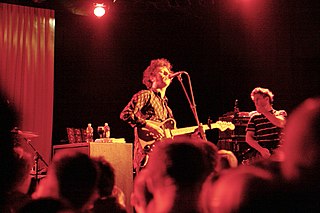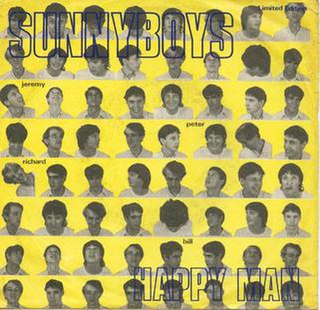
Rose Tattoo are an Australian rock and roll band, now led by Angry Anderson, which formed in Sydney in 1976. Their sound is hard rock mixed with blues rock influences, with songs including "Bad Boy for Love", "Rock 'n' Roll Outlaw", "Nice Boys", "We Can't Be Beaten" and "Scarred for Life". Their first four albums were produced by Harry Vanda and George Young who also worked with AC/DC. They disbanded in 1987, subsequently reforming briefly in 1993 to support Guns N' Roses on an Australian tour. They reassembled again from 1998 and have since released two more studio albums.

You Am I are an Australian power pop band, fronted by its lead singer-songwriter and guitarist, Tim Rogers. They formed in December 1989 and are the first Australian band to have released three successive albums that have each debuted at the number-one position on the ARIA Albums Chart: Hi Fi Way, Hourly, Daily and #4 Record. Nine of their tracks appeared on the related ARIA Singles Chart top 50 with "What I Don't Know 'bout You", their highest charting, at No. 28. You Am I have received ten ARIA Music Awards from thirty-one nominations. The band have supported international artists such as the Who, the Rolling Stones, Sonic Youth and Oasis.

Youth Group is an Australian rock band based in Newtown, New South Wales. Built around the vocals of singer Toby Martin and production of Wayne Connolly, the sound of Youth Group is reminiscent of indie rock artists such as Teenage Fanclub, Pavement and Death Cab for Cutie.
John Francis Kennedy is an English-born Australian musician and singer-songwriter–guitarist. He has been the leader of a number of groups including JFK & the Cuban Crisis (1980–84), and John Kennedy's Love Gone Wrong (1984–88). In 1984 he described his music as "urban and western".

"Flame Trees" is a song by Australian pub rock band Cold Chisel from their 1984 album Twentieth Century. One of their best known songs, it was written by drummer Steve Prestwich and keyboardist Don Walker. On its release it reached No. 26 on the Kent Music Report Singles Chart. It resurfaced in August 2011 due to download sales, peaking at No. 54 on the ARIA chart.

Skeleton Jar is the second album by Australian rock band Youth Group. It was first released in Australia on 22 March 2004, and on 24 May 2005 on Epitaph Records in the United States with a re-arranged track listing and one new song. The US version was released in Australia as a "repackaged" album in July 2004. In 2011 the album was voted #98 on Australian radio station Triple J's Hottest 100 Australian Albums of All Time.

Casino Twilight Dogs is the third studio album from Australian band Youth Group, released in Australia by Ivy League Records on 15 July 2006, then in the United States by ANTI- on 30 January 2007. The album came several months after the Australian chart success of the band's cover of Alphaville's "Forever Young", which had been recorded for the soundtrack of the US TV drama The O.C.. "Forever Young" had received extensive radio airplay and become a platinum-selling, No. 1 single in Australia, its success taking the band by surprise as they mixed Casino Twilight Dogs. The song, although different in style to their self-written material, was added as the album's final track.

Cold Chisel is the debut album of Australian pub rock band Cold Chisel. Released in April 1978, it spent 23 weeks in the Australian charts, peaking at number 38.
Wayne Paul Connolly is an Australian music producer, audio engineer and musician. From 1991 to 1997 Connolly played lead guitar and sang in guitar group The Welcome Mat and released two studio albums. Since 1994, he has played in Knievel with Tracy Ellis and Nick Kennedy. Knievel have released four studio albums and a compilation of B-sides and rarities.

Swingshift is a live album released by Australian band Cold Chisel in 1981. It was their first album to reach No. 1 on the Australian chart, debuting there in its first week. It peaked at number 9 in New Zealand. A press release said the title referred to, "the midnight to dawn shift that the staff in asylums dread: the hours when the crazies go crazy."

The Bells Line is the third album by Australian rock band 78 Saab. It was released in 2007.

Nervous Flashlights is the eighth studio album by Australian indie rockers, The Fauves, which was issued in June 2006 on Shock Records and was co-produced by the group with Wayne Connolly. Eleven of its twelve tracks were written by the band's vocalist and guitarist, Andrew Cox.

The Night Is Ours is the fourth studio album by Australian rock band Youth Group, released in Australia in June 2008 and in the US in April 2009. The album features guest musician Chris Walla of Death Cab for Cutie, who mixed four tracks and also provided additional guitar and backing vocals.

"Choirgirl" is a song by Australian rock band Cold Chisel, released as the lead single from their third studio album East (1980) in November 1979. A ballad written by Don Walker with an R&B-influenced melody, the song marked the first time the band had recorded with producer Mark Opitz. It peaked at No. 14 in Australia on the Kent Music Report.
"Leaps and Bounds" / "Bradman" is a double A-sided single by Australian rock group Paul Kelly and the Coloured Girls released in January 1987. "Leaps and Bounds" is from their debut double album, Gossip (1986). "Bradman" did not appear on a studio album until the international version of Under the Sun (1988). The single reached top 100 in the Australian Kent Music Report Singles Chart. Due to possible racist connotations the band changed its name, for international releases, to Paul Kelly and the Messengers. In 1997, Kelly was inducted into the ARIA Hall of Fame, at the ceremony Crowded House paid tribute to Kelly and performed "Leaps and Bounds". In October 2003, Xanthe Littlemore covered "Leaps and Bounds" for the tribute album, Stories of Me – A Songwriter's Tribute to Paul Kelly. In 2005, rock music writer, Toby Creswell described two of Kelly's songs: "Leaps and Bounds" and "From Little Things Big Things Grow" in his book, 1001 Songs. For the former, Creswell observed "The grand themes of [his] work are all there – Melbourne, football, transcendence and memory... [he] is a detail man – the temperature, the location, foliage". On 26 March 2006 Kelly performed at the Commonwealth Games closing ceremony in Melbourne, singing "Leaps and Bounds" and "Rally Around the Drum". In February 2009 Patience Hodgson, Glenn Richards and Kelly performed "Leaps and Bounds" at the Myer Music Bowl for SBS-TV's concert RocKwiz Salutes the Bowl. On 29 September 2012 Kelly performed "How to Make Gravy" and "Leaps and Bounds" at the 2012 AFL Grand Final although most of the performance was not broadcast on Seven Network's pre-game segment.

William Toby Martin, is an Australian singer-songwriter, musician, academic, and lecturer at University of Huddersfield UK. Martin is the grandson of Hungarian-born Australian poet David Martin and has a PhD in the history of Australian music from the University of Sydney. After fronting Sydney-based band Youth Group from 1996 to 2009, Martin developed his solo career, releasing his first album, Love's Shadow in 2012.

Rushall Station is the fourth album by Australian indie rock/electronic band Underground Lovers, released in 1996. It was named after Rushall railway station, located near the home of band member Vincent Giarrusso in Clifton Hill in Melbourne.

"Happy Man" is a song by Australian power pop band, Sunnyboys. It was written by lead singer-guitarist, Jeremy Oxley, and was the first single released in June 1981, on Mushroom Records, from their self-titled debut album, which followed in September. The studio tracks were produced by Lobby Loyde and engineered by Colin Freeman at Alberts Studios, Sydney. "Happy Man" reached No. 26 on the Kent Music Report singles chart. The live tracks were recorded at the Bombay Rock, Brunswick.

Using My Gills as a Roadmap is the seventh album by Australian rock band Died Pretty. The album, their second working with producer Wayne Connolly, was released in 1998.

Sold is the sixth album by Australian rock band Died Pretty. It was released in 1996 and peaked at No. 29 in the ARIA album charts. The album was the last to include drummer, Nick Kennedy, who left during recording; he was replaced in the sessions by Shane Melder, on loan from Sidewinder. It was co-produced by former Radio Birdman vocalist Rob Younger, who had produced the band's 1986 debut Free Dirt, and Wayne Connolly, who went on to co-produce their next two albums.

















